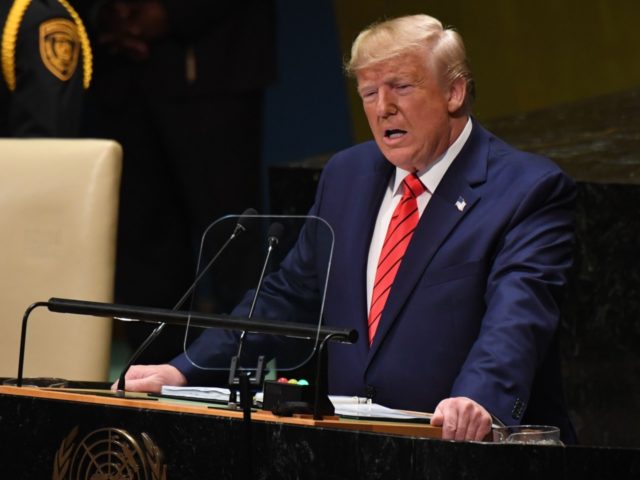President Donald Trump outlined the central political philosophy of his administration in his annual address to the opening of the United Nations General Assembly on Tuesday: national sovereignty is the foundation of liberty.
In his remarks, Trump contrasted “those whose thirst for control deludes them into thinking they are destined to rule over others” with “those people, and nations, who want only to rule themselves.” He described the United States as “a nation that prizes liberty, independence, and self-government above all,” adding that while the U.S. was also “by far the world’s most powerful nation,” America did not want to dominate others, but rather “vigorously defends the traditions and customs that have made us who we are.” Each other nation, he said, likewise had its own to defend.
He then declared:
The free world must embrace its national foundations. It must not attempt to erase them, or replace them. Looking around, and all over, this large, magnificent planet, the truth is plain to see: If you want freedom, take pride in your country. If you want democracy, hold onto your sovereignty. And if you want peace, love your nation.
President Trump went on to say: “Wise leaders always put the good of their own people and their own country first. The future does not belong to globalists. The future belongs to patriots.”
While the nations of the world could cooperate for the common good, he argued, citing examples such as the pending U.S.-Mexico-Canada free trade agreement, international institutions could not guarantee freedom.
A prime example of what Trump calls “globalism” appeared at the U.N. the day before, when California’s Governor Gavin Newsom appeared at a summit on climate change. Rather than expressing pride in America’s leadership as one of the only nations to reduce emissions while growing its economy for most of the past two decades, Newsom trashed his own country, declaring that he was “absolutely humiliated” by the policy the U.S. had adopted.
Trump did not say that nationalism is always right — and he has condemned forms of nationalism that adopt hatred as their creed. On Monday, for example, he attacked Iran for embracing and spreading the cult of antisemitism.
However, he argued that liberty is based on shared cultural foundations and traditions — which can be embraced by new members of a society, but without which that society can fail.
He cited the Second Amendment — not just as a way of rejecting new international restrictions on the right to bear arms, but to praise the Framers of the U.S. Constitution: “Our Founders … chose to entrust American power to those most invested in the fate of our nation: a proud and fiercely independent people.”
President Trump concluded: “Patriots see a nation and its destiny in ways no one else can. Liberty is only preserved, sovereignty is secured, democracy is only sustained, greatness is only realized, by the will and devotion of patriots. … Love of our nations makes the world better for all nations.”
Joel B. Pollak is Senior Editor-at-Large at Breitbart News. He earned an A.B. in Social Studies and Environmental Science and Public Policy from Harvard College, and a J.D. from Harvard Law School. He is a winner of the 2018 Robert Novak Journalism Alumni Fellowship. He is also the co-author of How Trump Won: The Inside Story of a Revolution, which is available from Regnery. Follow him on Twitter at @joelpollak.

COMMENTS
Please let us know if you're having issues with commenting.